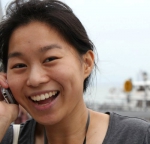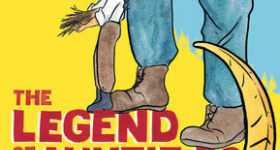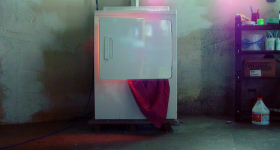Sung J. Woo’s sophomore novel Love Love is a delightful, quirky adventure that follows siblings Kevin and Judy Lee, forty-somethings who are neither entirely happy nor really certain of who they are. Love Love unfolds into a journey of self-rediscovery for both, through a series of circumstances that are both tragic yet genuinely comedic.
The story is deftly structured using alternating perspectives -- a choice that tastefully foils Kevin and Judy and their wildly different personalities. A former professional tennis player, Kevin works as a tennis coach at a local country club, a job that neither satisfies nor dissatisfies him. Obsessively practical and logical, he has built his athletic career through sheer perseverance and force of will and control. Kevin is the type of guy who has stuck with the same brand of toothpaste for years. Judy, on the other hand, is a former artist, floating from temp job to temp job. She does not have enough peanut butter to even make a PB&J sandwich.
Both are a little lost. Their marriages have each ended in divorce, their mother has recently passed away from cancer, and their father needs a kidney transplant urgently. When Kevin tests for compatibility, he finds out his father is not his jin-cha ah-pa (biological father), and his parents may or may not have been actors in the adult film industry in San Francisco in the late 1970s. His discovery soon propels him from New Jersey to California, as he asks himself for the first time, after all he has lost, who he is now.
Compared to Kevin, younger sister Judy tries but fails to cope. Disappointed and aimless professionally and personally, her failed relationships also include her fraught if not forcibly dissolved relationship with her father, whose face “growing up…was mostly hidden behind the newspaper. When he spoke, it was to tell her she’d done something wrong, and she’d given him plenty of opportunities.” While Judy blames her father for her mother’s death, she also blames herself, and struggles with her feelings of grief and regret.

Photo of the author by Dawn S. White
Love Love explores the overwhelming if not exhausting quest for answers when life keeps throwing lemons, and how relationships are founded and crumble. Kevin and Judy both enter new relationships and go to new places, and these force them to confront their old lives and learn to live with (or live without) the people they had once loved. Such heavy introspection, however, is enveloped in humor, and that is due to Woo’s ability to punctuate and bring into the fold increasingly comedic developments. Kevin’s version of Eat, Pray, Love has him traipsing all over San Francisco’s seven-by-seven and even Berkeley. He muses confusing “cross street” signs for the Powell cable cars, “drinks” ginger milk for the first time in Chinatown, and visits Alice Waters’ Chez Panisse in Berkeley, amongst other, less innocuous events. In between, he encounters a slew of characters who are stereotypically progressive and progressively funnier.
Given the levity, Love Love struggles to reconcile its humor with some of its more serious themes, such as mental health and wellness. Woo capably portrays the way Judy struggles and “consider[s] happiness like a brief visit from an old friend -- a great time that’s over before you know it and leaves you feeling empty after they depart” -- using his characters to raise the question and explore how to best live in the present. However, the challenge crystallizes when Woo incorporates mental health and wellness in the adult film industry into his story. Woo makes the best out of an uneven juxtaposition. He tries not to gloss over the matter, but the humor detracts from the seriousness of the issue.
A larger incongruity lies with his last-ditch effort to also raise awareness of issues surrounding adoption in South Korea. “One in two hundred children who are born in Korea, today, are still sent overseas … right now, South Korea has the lowest birth rate of any developed nation, and yet Koreans decline to adopt one of their own due to societal pressures. Because back there, it’s all about the bloodline … the way single mothers are ostracized, the lack of government-sponsored programs to help them, etc. It wasn’t that long ago that the country refused to consider orphans legal citizens,” plugs one character. While it complements a larger theme of belonging and identity, its sudden inclusion is less effective. Perhaps it opens possibilities of a sequel or third novel, but the significance of the issue is diminished amongst Woo’s other efforts.
A quick read, Love Love is a heartfelt and humorous pick-me-up for those days when everyday life seems a little uninspiring or a little uncertain. Those familiar with the geography and popular sites in San Francisco and Berkeley will certainly get a kick from following Kevin on his tour.










Comments